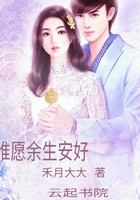They were told that Mr. Thorne was in his studio, and would see them there. They had sent no card, and Ronald believed the "two ladies" to have called on some business connected with pictures.
He started with surprise when Lady Charteris and Valentine entered. There were a few words of confused greeting, a hurried explanation of the circumstances that led Sir Hugh to Florence; and then Valentine looked long and steadily at the only man she had ever cared for. He was altered; the frank, handsome face looked worn and thin; it had a restless expression. He did not look like a man who had found peace. Lady Charteris told him of her last visit to Earlescourt--how his mother never ceased speaking of him, and his father still preserved the same rigid, unbending silence.
"I have seen your picture," said Lady Charteris. "How well you remembered my daughter's face."
"It is one not easily forgotten," he replied; and then another deep silence fell upon him.
"Where is Mrs. Earle?" asked Valentine. "Our visit is chiefly to her. Pray introduce her to mamma. I know her already by description."
"I left my wife in the garden," said Ronald; "shall we join her there?"
They followed him into the pretty sunlit garden, where Valentine had seen the pale, sad face.
"My wife is timid," said Ronald, "always nervous with strangers."
Dora was sitting under the shade of a large flowering tree, her hands folded, and her eyes riveted on the distant hills; there was something in her listless manner that touched both ladies more than any words could have done. A deep flush crimsoned her face when Ronald and his guests stood before her. She rose, not ungracefully; her eyelids drooped in their old shy manner. As Ronald introduced his wife, something in the girl's wistful face went straight to Lady Charteris's heart. She spoke not a word, but folded Dora in her arms and kissed her as her own mother might have done.
"You must learn to love us," said Valentine; "we are your husband's dearest friends."
Poor Dora had no graceful words ready; her heart was full of gratitude, but she knew not how to express it. Ronald looked at her anxiously, and she caught his glance.
"Now," thought Dora, "he will not be pleased." She tried to say something of her pleasure in seeing them, but the words were so stiff and ungracious that Ronald hastened to interrupt them.
A luncheon of fruit and wine was brought out into the garden, and they talked merrily--of Earlescourt and the dear old friends there; of the ball and Prince di Borgesi; in all of which Dora felt that she had no share.
Who was this beautiful lady, with her fair face and golden hair?
The same face she saw that Ronald had painted in his picture, and every one admired. How graceful she was! How she talked! The words seemed to ripple like music over her perfect lips. Where had Ronald known her? Why had he never told her of Miss Charteris?
"Ah!" thought Dora, "if I could be like her!" And a sudden sense of wonder struck her that Ronald had not loved and married this fair and gracious lady.
Valentine neither forgot nor neglected her. She tried to draw her into their conversation, but Dora replied so uneasily and so briefly to all her remarks that she saw the truest kindness was to leave her alone.
They spent a few hours pleasantly, and Lady Charteris would not leave until Ronald promised to take his wife to spend a long day with them.
"I can hardly promise for Dora," said Ronald, kindly; "she seldom leaves home."
"Mrs. Earle will not refuse me," said Valentine, with that smile which no one ever resisted. "She will come with you, and we will make her happy."
When the day was settled, the ladies drove away, and Ronald watched the carriage until it was out of sight.
"My dear Valentine," cried Lady Charteris when they were out of hearing, "my dear child, what could possess Ronald Earle? What could he see in that shy, awkward girl to induce him to give up everything and go into exile for her sake? She is not even pretty."
"She is altered, mamma," began Valentine.
"Altered!" interrupted Lady Charteris. "I should imagine she is, and unhappy, too. She is frightened to speak--she has no style, no manner, no dignity. He must have been insane."
"I am quite sure he loved her," said Valentine, warmly, "and loves her now."
"That is just the mystery," replied her mother--"a clever man like he is, accustomed to intelligent and beautiful women. I shall never understand it."
"Do not try," said Valentine, calmly. "She is evidently nervous and sensitive. I mean to be a true friend to Ronald, mamma; I shall try to train and form his wife."
Poor Dora! She was already trained and formed, but no one would understand that. People do not expect the perfume of the rose in a wild strawberry blossom, or the fragrance of the heliotrope in a common bluebell. Yet they wondered that in this ****** girl, ignorant of the world and it ways, they did not find a cultivated mind, a graceful manner, and a dignified carriage. Their only thought was to train and form her, whereas Nature and not Art had done both.
"Dora," said Ronald, as the carriage disappeared from view, "try to like Lady Charteris and her daughter; they are so kindly disposed toward you. I shall be so pleased to see you good friends" "I will try," she replied, cheerfully. "How beautiful she is, Ronald! Tell me about her. You remember her face exactly; should you remember mine as well?"
It was the first touch of jealousy stirring in the ******, loving heart.
"Far better," said Ronald, with a smile; and then he looked up in alarm, for Dora was weeping wildly, and clinging to him.
"Oh, Ronald!" she said, "for your sake I wish I was like her.
Shall you ever tire of me, or wish you had not married me?"
Ronald soothed and comforted his wife, and did not return to his studio that day, but sat talking to her, telling her how noble and good Valentine Charteris was.














